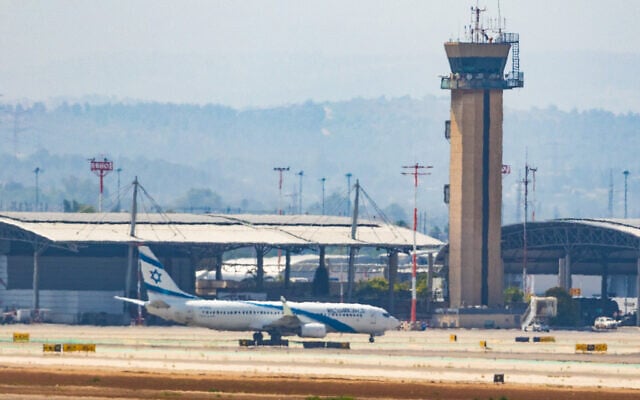


Even as Delta and Air Baltic resume flights to and from Tel Aviv this month, prices are soaring as bookings surge and many foreign carriers continue to delay their return amid the ongoing Gaza war.
The conflict, which could soon enter its third year, has put a damper on Israeli air travel, with most foreign airlines putting their service on hold and even domestic carriers often grounded due to security concerns.
Still, travel agencies are reporting a boom in ticket sales ahead of the Jewish High Holidays later this month, with vacation-hungry travelers rushing to secure tickets despite the high prices.
“Demand is very high ahead of the Jewish holidays and flight prices will continue to increase as we get closer,” Shirley Cohen Orkaby, vice president at Eshet Tours Group, told The Times of Israel. “Although some foreign airlines have resumed flights to Israel, they are not operating the full schedules they offered before the outbreak of war on October 7, 2023, while other carriers have not restarted service to Tel Aviv at all. That limited availability is pushing up airfares.”
Passenger traffic through Tel Aviv’s Ben Gurion Airport has gradually bounced back to pre-war levels over the past month, during the peak summer season, despite a 119 percent price hike in fares over the past two years.
The recovery follows Ben Gurion’s return to full operations at the end of June, after Israel closed its airspace for 12 days during its conflict with Iran. Following Israeli strikes on Iranian nuclear and military sites on June 13, and Tehran’s barrages of indiscriminate ballistic missile fire, most major European and US airlines halted flights to Israel or extended suspensions of already frozen routes — some through July or August, and others into September, October, or even 2026.
The wave of cancellations left thousands of Israelis stranded abroad or at home, scrambling to book new flights at inflated prices, make alternative arrangements, or cancel their vacation plans altogether.
Since Hamas’s October 7, 2023, bloody invasion of Israel, which saw some 1,200 people slaughtered and 251 abducted to the Gaza Strip, foreign airlines have repeatedly suspended and resumed service to Tel Aviv, leaving Israel’s air connection to the world largely dependent on local carriers El Al, Israir, and Arkia.
“Having had their vacations canceled when foreign airlines repeatedly stopped flying to and from Tel Aviv because of the security situation, many Israelis still prefer booking with Israeli carriers,” Cohen Orkaby said. “They are willing to pay more, as they don’t want to risk being stranded abroad or having their holidays ruined again if the situation deteriorates.”
European airlines that have recently resumed partial service to Tel Aviv include the Lufthansa Group (Lufthansa, SWISS, Austrian Airlines, Brussels Airlines, and Eurowings), Air France, LOT Polish Airlines, Hainan Airlines, Etihad Airways, Azerbaijan Airlines, Ethiopian Airlines, Uzbekistan Airways, Georgian Airways, Bulgaria Air, flydubai, Cyprus Airways, Air Seychelles, and Hungarian low-cost carrier Wizz Air.
Depending on the security situation, Italy’s ITA Airways and Dutch carrier KLM are expected to resume service at the end of September. Another wave of airlines — including Irish low-cost carrier Ryanair, Air Canada, Air India, and British Airways — have suspended their Tel Aviv routes until the end of October and have yet to confirm return dates. British low-cost giant easyJet has said it will not resume flights to Israel before spring 2026.
“There is strong demand among Israelis to travel during the upcoming Jewish holidays after a long period when they could not go abroad due to the security situation, or had trips canceled when foreign airlines pulled out,” said Revital Ben Natan, CEO of Ofakim Travel and Tours. “Many may not have traveled recently because fares were so high, but since prices are unlikely to drop, travelers are prepared to compromise by booking flights with a stopover instead of a direct route to make trips more affordable.”
“In addition, this year’s holiday calendar allows Israelis to enjoy a relatively long break without using many vacation days from work,” Ben Natan noted.
Most of the High Holidays — Rosh Hashanah and Yom Kippur later this month, followed immediately by Sukkot and Shemini Atzeret/Simhat Torah — fall mid-week, creating multiple non-working days and a significant vacation period for Israelis.
“There is also noticeable demand for bookings to distant destinations in the Far East, such as Thailand and Japan, as well as the United States, led by New York, which is always popular,” Ben Natan said.
Four airlines now operate the Tel Aviv–New York route: El Al and Arkia, along with US carriers United Airlines and Delta. Israir has announced plans to join the route in April 2026.
Despite the return of US carriers, fares to New York remain high. Round-trips for late September through mid-October are selling for between $2,015 and nearly $3,000 on United and Delta, depending on the dates. El Al’s economy-class seats on the Tel Aviv–New York route are almost sold out for the same period.
Cohen Orkaby and Ben Natan said nearby destinations such as Greece and Cyprus — especially popular over the past year — continue to attract many Israelis. Other favored locations include Eastern European cities such as Budapest, Balkan countries like Montenegro, and destinations farther east, including Azerbaijan.
“Ticket prices are very dynamic. Depending on the dates, round-trip fares to Athens can reach as high as $700 during the High Holiday season as cheaper tickets sell out,” said Cohen Orkaby.
Both Ben Natan and Cohen Orkaby agreed that prices will continue to climb until the end of the holiday season in mid-October.
“We are likely to see fares stabilize somewhat after the holidays as demand subsides,” Ben Natan said. “But for prices to return to prewar levels, we’ll need more competition, a full return of foreign airlines, and increased flight frequencies.”




